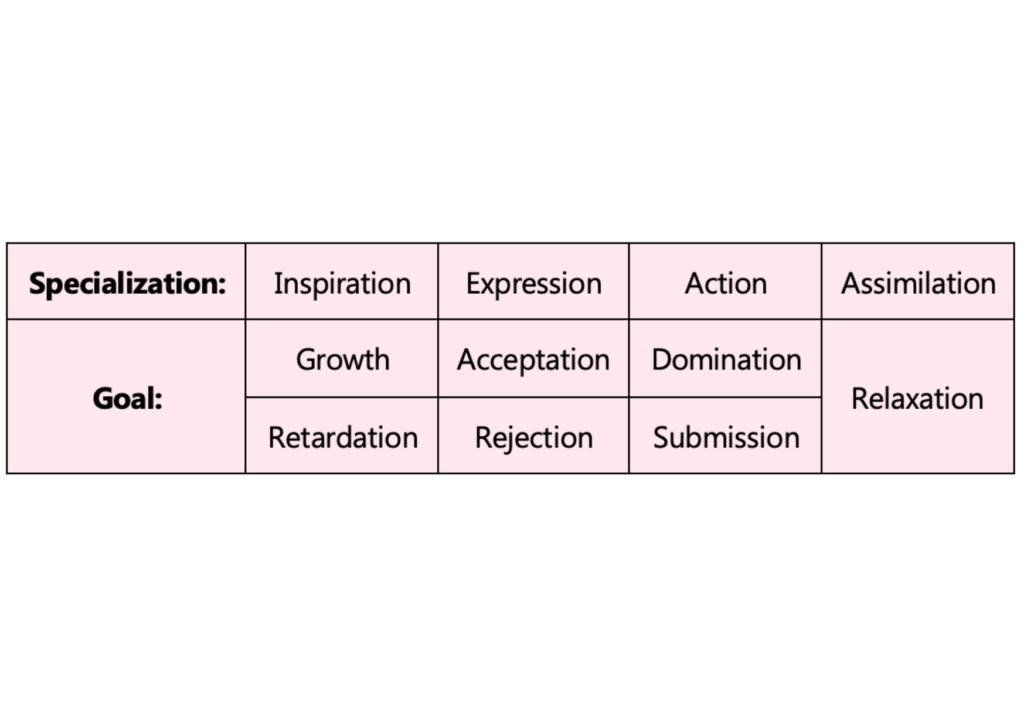Personality and its goals – your driving force.
Each personality has its goal and therefore also your personality has a goal that is its driving force. This is not something specific, such as becoming a famous singer and living in a huge villa near Los Angeles, or becoming a wife of a Russian oligarch.
In this article:
- You will learn what the purpose of personality is.
- You will identify the purpose of your personality: growth, acceptation, domination, retardation, rejection, relaxation, and submission.
This goal also has nothing to do with your personal dreams. It doesn’t appear on any of your to-dos before the 40ty bucket lists and it does not have any checkbox. You will not be able to account for it when analyzing your life achievements after forty. This goal, however, affects what you put on your personal list of life goals. Of course, only if you provided that ones which are really your goals, not the goals you’ve got in your head by social expectations.

The goal is not a specific, described thing, but rather a direction in which each of us wants their life to follow.
For some, it can be, for example, building positive relationships with others. For example, they want to love and be loved. Such people have the purpose of acceptance. Others, however, want to use all of their potential in their lives. They want to be the best version of themselves that they can be and strive for continuous growth. The goal of these people is therefore growth.
The goal is like your inner compass, which gives direction to all your choices, even the trivial one. It guides you through life directly or indirectly influencing your choices. That is why in all personal development guidebooks or coaching sessions they always tell you to listen to yourself. Even seemingly insignificant decisions taken every day can have a big impact on the course of your life.
Of course, not only the goal influences your life.
Especially at the beginning of life, when you make a lot of decisions under the influence of parents’ expectations, peer pressure or fashion. The choices you make always depend on the options available. Sometimes you even feel that you are doing something against yourself and therefore something inconsistent with your life goal. It usually ends with dissatisfaction and frustration. To avoid this, you should be more sensitive to your intuition. Let it come to the force. It also makes no sense to fight with your goal. You rather should understand and surrender it with full awareness, also remembering its negative aspects.
The midlife crisis that you are experiencing is really the work of your inner compass, which tries to bring you to the right path of life. It makes no sense to fight it, because it will only aggravate your frustration. Try to recognize and accept it. The highest time to do it. Set aside all false beliefs and follow your true purpose.
There are 7 types of goals that, like soul types, have their specialties:

The Goal of Retardation.
This is the most introverted of goals. Sometimes it is also called a re-evaluation. It means slowing down or holding back. It drives the personality to withdraw from the wider world and focus inward. Being alone with your thoughts and feelings. In a positive sense, it is atavism, simplicity, evaluation and negative withdrawal or getting stuck.
It consists of slowing down the pace and intensity of life experiences in order to reach the next level of development by staying in oneself, focusing on oneself, introspection and contemplation. A good example of a man with such a goal is Stephen Hawking, who thanks to it could focus on his theoretical considerations. Most monks have similar goals.
People with such a goal often do not feel well in modern societies or too loud or highly interactive circumstances. They can not work in places where too much is going on or if they have a lot of deadlines to meet. They can concentrate only on one task. The people always set a list of priorities and deal with only the most important matters. They have very small requirements, they are very economical, they are rather home-lovers. This is a rare goal, found only in 1% of the population.
The Goal of Rejection.
It is about separating one thing from another, finding contrasts, highlighting differences. Expressing yourself, but by rejecting any requirement to adapt to others, to the general public or to conditions. A person with this goal does not agree with the common herd and tries to be true only to themself. An individualist, nonconformist, loner. In the negative sense it can manifest as intolerance, discrimination, misanthropy, bigotry, and in positive perfectionism or sophistication. People with this goal are very selective, fastidious, and critical. They are often brutally honest and they notice subtle differences between things and focus on them. They are good at classifying things into different categories.
The purpose of this discrimination is to develop the ability to be faithful to yourself, regardless of what others think about you.
David Bowie is a famous example of a man with this goal. About 2% of the population has this goal.
The Goal of Submission.
This goal expresses in the search for passivity, submissiveness, submission to existing forces. This submission applies to everything from a partner, society, employer etc.
A man with this goal is looking for someone or something for whom they can devote their life. They allows others to take the lead and then willingly and obediently responds to them. Such a person does not do things but allows them to happen.
This goal is to get rid of the ego in the sense of one’s will and complete surrender to reality.
A person with this goal has a strong sense of duty and responsibility. They is faithful and honorable and likes working in a group for a specific purpose. They is a good and loyal employee who devotes their work and allows it to rule their whole life. Similarly behaves in relationships.
In a positive sense, it is concern, loyalty, sacrifice and in a negative addiction, martyrdom, and powerlessness.
Subjecting can apply to both serving a family member as a husband or father, or a nation or ideology. An example of this may be Gandhi or John Paul II. The word Islam means submission, so there is a pattern of attitude created by this religion.
This goal applies to 10% of the population.
The Goal of Relaxation.
It consists of letting life manifest its own path without trying to impose any specific direction or goal on it. On life without effort, with lightness and fluency. It concerns getting rid of stress and avoiding it. People with this goal are balanced, relaxed, living for the moment, stable, and reliable. They avoid disturbances in the normal order of things. Sometimes such a person is deprived of a purpose in life or ambition. This does not mean that such a person is completely passive, but they tries to surf the waves of life.
The purpose of relaxation is to be present without pushing for a better future, finding satisfaction with what appears. As a rule, the soul chooses this goal after having had to deal with quite traumatic events in the previous life. It can also be done to learn how to let go.
Eckhart Tolle is such an example. In a positive sense, it is suspension, neutrality, and in negative: inertia or stagnation. Taoism represents this attitude.
It is observed in 7% of the population.
The Goal of Acceptation.
It involves seeking harmony and positive relationships in order to demonstrate our community, bond, and unity. Searching for similarities in things and their emphasis. From the soul’s point of view, this is a way to overcome the human illusion of separation and alienation.
For a person with such a goal, compatibility is what counts in a relationship, the more common the better. A person with this goal tries to always be nice, cooperative, tactful, like everything and everyone. Friendly and natural lovers of humanity. Love is everything to them. Very popular and liked among others. Forgiving, warm with an open heart.
This is a common goal, observed in 30% of the population. This attitude is the essence of Buddhism. The famous example here is Dalai Lama.
In a positive aspect, it is called agape or unconditional love, altruism in negative: flattery or hypocrisy.
The Goal of Growth.
It is a very difficult goal for its owner because it makes you always want more, better, and more wonderful. This causes eternal dissatisfaction and anxiety. It means development, maturation, and evolution.
Such a person often takes on more than they can manage. They likes to constantly cross the limits of their abilities. They’s easy to get bored, they has to be constantly stimulated, constantly experiencing something new. A person with this goal is very open, likes to have people around according to the rule the more the merrier. If anyone does not respond to their invitation, they feels very much affected.
She is also eager to learn and she is very adventures.
In a positive sense, it is understanding or development in negative chaos and confusion.
It applies to 40% of the population. A well-known example of a person with this purpose is Barack Obama. With this aim, the soul chooses a faster path to the evolution of consciousness. It helps you move to the next level of development.
The Goal of Domination.
The most extroverted of the goals. It involves seeking power and influence on life. The soul chooses it when it wants to have control or influence. It means the desire to initiate events. A person with this goal does not allow things to be, they just have to make them behave the way they want.
A person with this goal is not influenced by others, they creates their own rules. They tells others what to do. They is frustrated when they can’t control events. In the professional situation it includes the role of a leader and will be promoted until they becomes the boss. If they does not succeed, they usually opens their own company because they feels uncomfortable working for somebody. Such a person often has problems with cohesion due to the need to initiate actions and often changes things only because of change. Such a person is determined, assertive, arrogant, and insolent.
In a positive sense, it’s leadership and a negative dictatorship. 10% of the population has this goal. A well-known person with this goal is Vladimir Putin.
As you can see, life is the means to achieve the goal. You live in order to learn more truth (Growth and Delay) or to love yourself and others more (Acceptance and Rejection) or to make something happen in the world (Domination and Submission). Throughout your life, You consciously or not try to enter this direction to fulfill your goal.
And do you know what your personality goal is?
Source:
Phillip Wittmeyer „The Seven Goals” michaelteachings.com
Barry „GOAL: the driving force of the personality”, personality spirituality.net
Shepheard Hoodwin „Michael on the Overleaves, Part Five”, The Michael Teachings, michaelteachings.com
Jose Luis Stevens, Simon Warwick-Smith „The Michael Handbook: A Channeled System for Self Understanding”, Warwick Press, 1994
Phillip Wittmeyer and Others „Goal of Flow”, The Michael Teachings, michaelteachings.com
Phillip Wittmeyer and Others „Goal of Discrimination”, The Michael Teachings, michaelteachings.com
Phillip Wittmeyer and Others „Goal of Submission”, The Michael Teachings, michaelteachings.com
Phillip Wittmeyer and Others „Goal of Reevaluation”, The Michael Teachings, michaelteachings.com
Phillip Wittmeyer and Others „Goal of Acceptance”, The Michael Teachings, michaelteachings.com
Phillip Wittmeyer and Others „Goal of Growth”, The Michael Teachings, michaelteachings.com
Phillip Wittmeyer and Others „Goal of Dominance”, The Michael Teachings, michaelteachings.com
Phillip Wittmeyer and Others „Goal of Growth”, The Michael Teachings, michaelteachings.com

